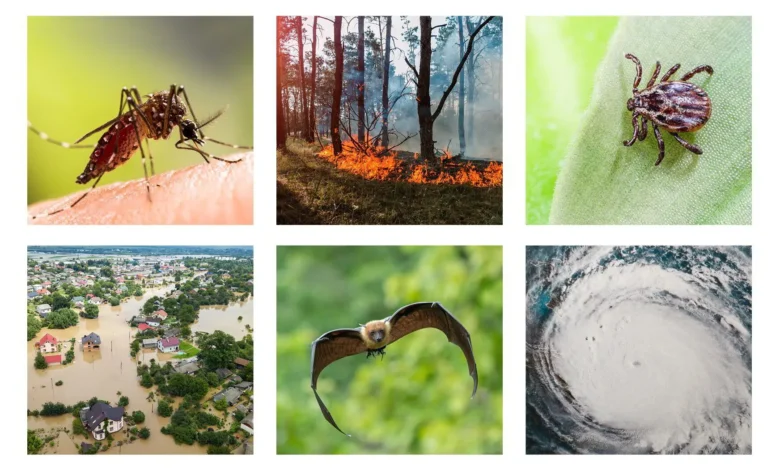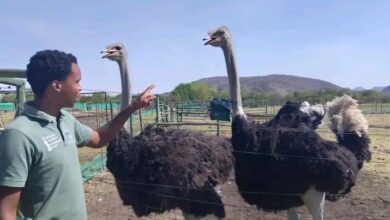UP and Cornell University establish Centre for Transformative Infectious Disease Research

UP and Cornell University establish Centre for Transformative Infectious Disease Research. The University of Pretoria (UP) and the Department of Public and Ecosystem Health at the Cornell University College of Veterinary Medicine have received a grant from the USA’s National Institutes of Healthto establish the Center for Transformative Infectious Disease Research on Climate, Health, and Equity in aChanging Environment (C-CHANGE).
Climate change is accelerating the spread of diseases transmitted by mosquitoes and ticks, as well asincreasing the risk of zoonotic viruses spilling over from animals to humans. C-CHANGE aims to address thesechallenges, offering new solutions to the ways climate change is directly impacting global human health. Thecentre’s research will involve collaboration between faculty and students from both UP and Cornell.
“The collaboration between the University of Pretoria and Cornell University marks a significant step forwardin addressing the complex intersection of climate change, public health, and infectious diseases,” said Professor Sunil Maharaj, Vice-Principal for Research, Innovation and Postgraduate Education at UP. “By uniting experts across disciplines and working alongside vulnerable communities, this research will not only enhanceour ability to predict and prevent disease outbreaks, but also foster innovation in sustainable health solutions for both South Africa and the global community.”
Dr Alexander Travis, Director of Cornell Public Health, said: “To have the greatest health impacts, we mustpivot from reactively responding to outbreaks to proactively understanding the social and environmental conditions that increase risk of outbreaks. If we can understand the conditions that allow diseases to emergeor spread, then we can predict when they will happen and work to prevent them, which is our ultimate goal.”
Dr Travis is also the founding chair of the Department of Public and Ecosystem Health, and multi-PI of thecentre, along with Dr Marinda Oosthuizen, Professor and Deputy Dean of Research and Postgraduate Studiesat UP’s Faculty of Veterinary Science.
“Preventing the outbreak of disease before it occurs is the best way to protect the public’s health,” Dr Travissaid. The centre’s faculty and trainees will partner with rural communities – primarily in South Africa and New York State – who are most vulnerable to these changes, to collect and integrate diverse data on climate, landuse, human and animal health, disease vectors and the pathogens themselves. These teams will createpredictive epidemiological models that can both help communities prepare and form the basis of practical,preventative interventions.
This approach solves a long-standing challenge in the field. “Traditionally, academics working in differentdisciplines, such as the interface of climate change and infectious disease, have had minimal ability tounderstand or take advantage of each other’s approaches and data. And external partners in government andcommunities typically find these results both inaccessible and unhelpful,” Travis said. “C-CHANGE hasassembled a truly transdisciplinary team to break down those siloes between disciplines, and betweenacademics and our community partners.”
The first major research project will focus on viral pathogen spill over and will be led by UP’s Dr Wanda Markotter, Professor and Director of the Centre for Viral Zoonoses in the Faculty of Health Sciences, andCornell’s Dr Raina Plowright, the Rudolf J and Katharine L Steffen Professor of Veterinary Medicine. They will investigate how climate extremes and land use changes result in wildlife stress, increasing both viral shedding and interaction with humans, facilitating viral spill over events.
The second major research project will be led by UP’s Dr Oosthuizen; UP’s Dr Veronica Ueckermann, Head: Infectious Diseases, Steve Biko Academic Hospital and Associate Professor in the Department of Internal Medicine as well as Dr Megan Riddin, lecturer and researcher at UP’s Institute for Sustainable Malaria Control(UP ISMC), and Professor Tiaan de Jager, Dean of UP’s Faculty of Health Sciences and Director of the UP ISMC. Dr Laura Goodman, Assistant Professor at Cornell will also be involved with this project.
The researchers will explore animal and human health, ecological and genomic data on tick- and mosquitoborne diseases in the context of climate change. This knowledge will be used to create community-based early warning systems for when to expect increased risk that these vectors will be active and carry and transmit the pathogens. Communities and healthcare systems can then try to prevent and prepare for the diseases they carry.
Two transdisciplinary cores will support these and a series of smaller research projects. The first core, theLiving Evidence and Applied Data Modeling Core, led by UP’s Dr Vukosi Marivate, Professor and Chair of DataScience and Cornell’s Dr Alistair Hayden, Dr Laura Smith, and Dr Ana Bento, will ensure that all data generatedis accessible across disciplines to all C-CHANGE researchers and partners. These researchers will also providetraining on how to integrate diverse data such as temperature, precipitation, pathogen and vector genomics,human movement, vector life cycles, and human and animal health, in creating holistic models.
The work of the Community Engagement Core is equally critical to the centre’s success. Led by UP’s Dr Ilana Van Wyk, and Cornell’s Dr Gen Meredith, Associate Director of Cornell Public Health and head of its HealthImpacts Core, this Core will work in rural communities in South Africa, Zimbabwe and New York State. They will ensure that C-CHANGE’s researchers’ partner with the most vulnerable communities from the initial stagesof research design to the production and communication of results that are useful to those communities.
This focus is essential, Oosthuizen said. “Whether in Africa or North America, rural communities often bearthe greatest infectious disease burdens from climate change. The research C-CHANGE performs will help usunderstand how climate change is increasingly putting people at risk, so we can try to prevent it.”
Oosthuizen further notes the unique advantage of C-CHANGE’s collaboration: “By combining data andexpertise across ecosystems, public health, and social dynamics, we can develop a proactive approach todisease prevention that empowers vulnerable communities. This is not just about managing disease – it’sabout creating resilience in a changing climate.”




